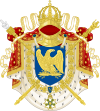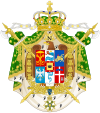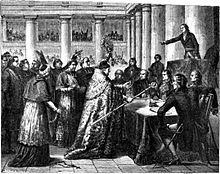Warfare
Further information: Napoleonic weaponry and warfare and Military career of Napoleon Bonaparte

Statue in Cherbourg-Octeville unveiled by Napoleon III in 1858. Napoleon I strengthened the town's defences to prevent British naval incursions.
Weapons and other kinds of military technology remained largely static through the Revolutionary and Napoleonic eras, but 18th century operational mobility underwent significant change. Napoleon's biggest influence was in the conduct of warfare. Napoleon was regarded by the influential military theorist Carl von Clausewitz as a genius in the operational art of war, and historians rank him as a great military commander. Wellington, when asked who was the greatest general of the day, answered: "In this age, in past ages, in any age, Napoleon."
Napoleon suffered various military setbacks however: Aspern-Essling in 1809, Russia in 1812 and at Leipzig in 1813. He also had to abandon his forces in Egypt — the result of strategic defeat rather than any reverse in pitched battle. With the exception of two small scale battles in Italy, Napoleon was not defeated in a field battle without being heavily outnumbered. However, Napoleon can be said to have had a vice: his success contained the seeds of its own failure, because Napoleon would keep conquering until rendered unable to do so by defeat.
Under Napoleon, a new emphasis towards the destruction, not just outmanoeuvring, of enemy armies emerged. Invasions of enemy territory occurred over broader fronts which made wars costlier and more decisive. The political impact of war increased significantly; defeat for a European power meant more than the loss of isolated enclaves. Near-Carthaginian peaces intertwined whole national efforts, intensifying the Revolutionary phenomenon of total war.
Metric system
Main article: Metric system
The official introduction of the metric system in September 1799 was unpopular in large sections of French society, and Napoleon's rule greatly aided adoption of the new standard across not only France but the French sphere of influence. Napoleon ultimately took a retrograde step in 1812, as he passed legislation to return France to its traditional units of measurement, but these were decimalised and the foundations were laid for the definitive introduction of the metric system across Europe in the middle of the 19th century.Napoleonic Code
Main article: Napoleonic code

First page of the 1804 original edition of the Code Civil
Napoleon and religions
Further information: Napoleon and the Catholic Church
Napoleon's baptism was held in Ajaccio on 21 July, 1771, he was piously raised and received a Christian education, however his teachers failed to give faith to the young boy. As an adult, Napoleon was described as a "deist with involuntary respect and fondness for Catholicism." He never believed in a living God, Napoleon's deity was an absent and distant God, but he pragmatically considered organised religions as key elements of social order, and especially Catholicism, whose "splendorous ceremonies and sublime moral" better act over the imagination of the people than other religions Napoleon had a civil marriage with Joséphine de Beauharnais, without religious ceremony, on 9 March 1796. During the campaign in Egypt, Napoleon showed much tolerance towards religion for a revolutionary general, holding discussions with muslim scholars and ordering religious celebrations, but General Dupuy, who accompanied Napoleon, revealed the political reasons for such behaviour: "We are fooling Egyptians with our pretended interest for their religion; neither Bonaparte nor we believe in this religion more than we did in Pius the Defunct's one". Napoleon crowned himself Emperor Napoleon I on 2 December 1804 at Notre Dame de Paris with the benediction of Pope Pius VII. The 1 April 1810, Napoleon religiously maried the Austrian princess Marie Louise. In a private discussion with general Gourgaud during his exile on Saint Helena, Napoleon expressed materialistic views on the origin of man, and doubted the divinity of Jesus, stating that it is absurd to believe that Socrates, Plato, Muhammad and the Anglicans should be damned for not being Roman Catholics. However Napoleon was anointed by a priest before his death.Concordat
Further information: Concordat of 1801
Seeking national reconciliation between revolutionaries and Catholics, the Concordat of 1801 was signed on 15 July 1801 between Napoleon and Pope Pius VII. It solidified the Roman Catholic Church as the majority church of France and brought back most of its civil status.During the French Revolution, the National Assembly had taken Church properties and issued the Civil Constitution of the Clergy, which made the Church a department of the State, removing it from the authority of the Pope. This caused hostility among the Vendeans towards the change in the relationship between the Catholic Church and the French government. Subsequent laws abolished the traditional Gregorian Calendar and Christian holidays.
While the Concordat restored some ties to the papacy, it was largely in favor of the state; the balance of church-state relations had tilted firmly in Napoleon's favour. Now, Napoleon could win favor with the Catholics within France while also controlling Rome in a political sense. Napoleon once told his brother Lucien in April 1801, "Skillful conquerors have not got entangled with priests. They can both contain them and use them." As a part of the Concordat, he presented another set of laws called the Organic Articles.
Jewish emancipation
Further information: Napoleon and the Jews
Napoleon emancipated Jews (as well as Protestants in Catholic countries and Catholics in Protestant countries) from laws which restricted them to ghettos, and he expanded their rights to property, worship, and careers. Despite the anti-semitic reaction to Napoleon's policies from foreign governments and within France, he believed emancipation would benefit France by attracting Jews to the country given the restrictions they faced elsewhere. He stated "I will never accept any proposals that will obligate the Jewish people to leave France, because to me the Jews are the same as any other citizen in our country. It takes weakness to chase them out of the country, but it takes strength to assimilate them." He was seen as so favourable to the Jews that the Russian Orthodox Church formally condemned him as "Antichrist and the Enemy of God".Bonapartism
Main article: Bonapartism
In French political history, Bonapartism has two meanings. The term can refer to people who restored the French Empire under the House of Bonaparte including Napoleon's Corsican family and his nephew Louis. Napoleon left a Bonapartist dynasty which ruled France again; Louis became Napoleon III, Emperor of the Second French Empire and was the first President of France. In a wider sense, Bonapartism refers to a broad centrist or center-right political movement that advocates the idea of a strong and centralised state, based on populism.Criticism
Napoleon ended lawlessness and disorder in post-Revolutionary France.He was, however, considered a tyrant and usurper by his opponents.His critics charge that he was not significantly troubled when faced with the prospect of war and death for thousands, turned his search for undisputed rule into a series of conflicts throughout Europe and ignored treaties and conventions alike. His role in the Haitian Revolution and decision to reinstate slavery in France's oversea colonies are controversial and have an impact on his reputation. Napoleon institutionalised plunder of conquered territories: French museums contain art stolen by Napoleon's forces from across Europe. Artefacts were brought to the Musée du Louvre for a grand central museum; his example would later serve as inspiration for more notorious imitators. He was compared to Adolf Hitler most famously by the historian Pieter Geyl in 1947. David G. Chandler, historian of Napoleonic warfare, wrote that, "Nothing could be more degrading to the former and more flattering to the latter."
Critics argue Napoleon's true legacy must reflect the loss of status for France and needless deaths brought by his rule: historian Victor Davis Hanson writes, "After all, the military record is unquestioned—17 years of wars, perhaps six million Europeans dead, France bankrupt, her overseas colonies lost." McLynn notes that, "He can be viewed as the man who set back European economic life for a generation by the dislocating impact of his wars. However, Vincent Cronin replies that such criticism relies on the flawed premise that Napoleon was responsible for the wars which bear his name, when in fact France was the victim of a series of coalitions which aimed to destroy the ideals of the Revolution.
International Napoleonic Congresses are held regularly and include participation by members of the French and American military, French politicians and scholars from different countries.
Titles, styles, honours and arms
| Monarchical styles of Napoleon I, Emperor of the French | |
|---|---|
 | |
| Reference style | His Imperial Majesty |
| Spoken style | Your Imperial Majesty |
| Alternative style | My Lord |
| Monarchical styles of Napoleon I of Italy | |
|---|---|
 | |
| Reference style | His Royal Majesty |
| Spoken style | Your Royal Majesty |
| Alternative style | My Lord |
Titles and styles
- 18 May 1804–11 April 1814: His Imperial Majesty the Emperor of the French
- 17 March 1805–11 April 1814: His Imperial and Royal Majesty the Emperor of the French, King of Italy
- 20 March 1815–22 June 1815: His Imperial Majesty the Emperor of the French
Full titles
1804–1805
His Imperial Majesty Napoleon the First, By the Grace of God and the Constitutions of the Republic, Emperor of the French.1805–1806
His Imperial and Royal Majesty Napoleon the First, By the Grace of God and the Constitutions of the Republic, Emperor of the French, King of Italy.1806–1809
His Imperial and Royal Majesty Napoleon the First, By the Grace of God and the Constitutions of the Republic, Emperor of the French, King of Italy, Protector of the Confederation of the Rhine.1809–1814
His Imperial and Royal Majesty Napoleon the First, By the Grace of God and the Constitutions of the Republic, Emperor of the French, King of Italy, Protector of the Confederation of the Rhine, Mediator of the Helvetic Confederation.1815
His Imperial Majesty Napoleon the First, By the Grace of God and the Constitutions of the Republic, Emperor of the French.Ancestry
Titles
| Emperor Napoleon I of France | ||
| Political offices | ||
|---|---|---|
| Preceded by French Directory | Provisional Consul of France 11 November – 12 December 1799 Served alongside: Roger Ducos and Emmanuel-Joseph Sieyès | Became Consul |
| New title | First Consul of France 12 December 1799 – 18 May 1804 Served alongside: Jean Jacques Régis de Cambacérès (Second Consul) Charles-François Lebrun, duc de Plaisance (Third Consul) | Became Emperor |
| Regnal titles | ||
| Vacant Title last held by Louis XVI of Franceas King of the French | Emperor of the French 18 May 1804 – 11 April 1814 | Succeeded by Louis XVIII of France as King of France and Navarre |
| Vacant Title last held by Charles V, Holy Roman Emperoras last crowned monarch, 1530 | King of Italy 17 March 1805 – 11 April 1814 | Vacant Title next held by Victor Emmanuel II of Savoy |
| Preceded by Louis XVIII of France as King of France and Navarre | Emperor of the French 20 March – 22 June 1815 | Succeeded by Louis XVIII of France as King of France and Navarre (Napoleon II according to his will only) |
| New title State created | Protector of the Confederation of the Rhine 12 July 1806 – 19 October 1813 | Rhine Confederation dissolved |
| Titles in pretence | ||
| New title | — TITULAR — Emperor of the French 11 April 1814 – 20 March 1815 | Vacant Title next held by Napoleon II |
